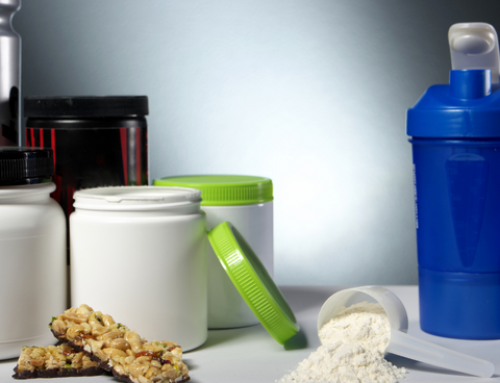The Best Pre-Workout Supplements
To be bigger, faster and last longer, athletes often turn to supplements for a competitive edge. But with more than thirty thousand supplements available in the USA alone, it’s increasingly difficult to distinguish between those that are effective and those that are not. The sad fact is that research shows only a handful have actually proven to be effective. Try the following healthy supplements before your next workout or competition to experience a safe and effective performance boost.
Sodium Bicarbonate
Since the 1930s, athletes have used sodium bicarbonate for sports enhancement. Due to its ability to delay fatigue by reducing lactic acid build-up, sodium bicarb can be effective for high intensity training. In a recent study, athletes who supplemented with sodium bicarb showed a 14 percent improvement in performance levels. This translates to a sprinter gaining about two to three seconds in a middle distance race. For enhancing sprinting performance, studies also concluded that sodium bicarb is superior to alternatives like citrate, lactate and chloride.
If consuming sodium bicarb in capsules, spread them out over two to three hours before exercise, or at the same time as a carb-rich pre-workout meal with some fluid. Consult with a sports dietitian to figure out your individual sodium bicarb needs.
Caffeine
A natural substance, caffeine is found in a variety of plants, notably coffee and cacao. In 2004, the World Anti-Doping Agency removed its ban on caffeine due its prevalence in people’s everyday diets. Studies show that caffeine exerts its main performance enhancing effects by reducing feelings of fatigue. In addition to endurance performance, recent research also suggests that caffeine proves beneficial in enhancing strength.
With only a small dose (90 mg) of caffeine, well-trained cyclists made one-minute improvements in time trials. So shoot for dosages of one to three milligrams per kilogram of bodyweight (or .5 to 1.5 mg per pound). To put things in perspective, a cup of espresso can contain up to 200mg of caffeine. At such high levels of caffeine intake, athletes may experience increased heart rates, anxiety and loss of fine motor control, all of which can impair performance. So if you wish to supplement with caffeine, it’s important to establish your tolerance level.
Beta-Alanine
β-Alanine plays a role similar to sodium bicarb by delaying skeletal muscle fatigue. It’s found in various meats and poultry, and it’s produced in the liver. β-alanine works to reduce the acidity of muscle tissue through the formation of carnosine. Increasing carnosine in muscle tissue is reported to enhance both endurance and strength performance. This makes it extremely effective for high intensity training.
Individuals supplementing with β-alanine showed delayed time to fatigue. They were also able to sustain a higher volume of training and produce greater power output, which in turn led to significant fat loss and gains in lean muscle mass. High intensity training, when supplemented with β-alanine, is suggested to improve cardiovascular health through increased work capacity.
When taken in doses greater than 800 milligrams, β-alanine can cause a numbing or tingling sensation in the skin. This usually disappears within an hour, and the effects are dampened when β-alanine is consumed with carbs. Recent studies show time-released dosage of 1.6 grams four times a day increased muscle carnosine by 40 percent without side effects.
Nitrates
The latest supplement to join the ranks is nitrates, particularly in beetroot juice, but also in leafy green vegetables like spinach, rocket arugula and celery.
Cyclists were shown to instantly improve their time trials by about two percent after supplementing with beetroot juice. Consume a half-liter of beetroot juice two to three hours before competition or training. You can buy beetroot juice through Beet it. Alternatively, try juicing it yourself.
The Academy of Nutrition and Dietetics recommends that nitrate supplementation should come only from natural sources such as whole vegetables or vegetable juices. Nitrates from other sources may be adverse to health. It may even be life threatening if supplementation is confused with nitrite, which is known to be toxic even at low levels. Athletes with FODMAP intolerance may wish to replace beetroot juice with spinach. (Per dietsolutions.net, FODMAP stands for Fermentable Oligo-, Di-, Mono-saccharides and Polyols, a group of short-chain carbohydrates that are poorly absorbed.)
Photo: Clinicme.com
RECOMMENDED FOR YOU
MOST POPULAR
The Best Pre-Workout Supplements
To be bigger, faster and last longer, athletes often turn to supplements for a competitive edge. But with more than thirty thousand supplements available in the USA alone, it’s increasingly difficult to distinguish between those that are effective and those that are not. The sad fact is that research shows only a handful have actually proven to be effective. Try the following healthy supplements before your next workout or competition to experience a safe and effective performance boost.
Sodium Bicarbonate
Since the 1930s, athletes have used sodium bicarbonate for sports enhancement. Due to its ability to delay fatigue by reducing lactic acid build-up, sodium bicarb can be effective for high intensity training. In a recent study, athletes who supplemented with sodium bicarb showed a 14 percent improvement in performance levels. This translates to a sprinter gaining about two to three seconds in a middle distance race. For enhancing sprinting performance, studies also concluded that sodium bicarb is superior to alternatives like citrate, lactate and chloride.
If consuming sodium bicarb in capsules, spread them out over two to three hours before exercise, or at the same time as a carb-rich pre-workout meal with some fluid. Consult with a sports dietitian to figure out your individual sodium bicarb needs.
Caffeine
A natural substance, caffeine is found in a variety of plants, notably coffee and cacao. In 2004, the World Anti-Doping Agency removed its ban on caffeine due its prevalence in people’s everyday diets. Studies show that caffeine exerts its main performance enhancing effects by reducing feelings of fatigue. In addition to endurance performance, recent research also suggests that caffeine proves beneficial in enhancing strength.
With only a small dose (90 mg) of caffeine, well-trained cyclists made one-minute improvements in time trials. So shoot for dosages of one to three milligrams per kilogram of bodyweight (or .5 to 1.5 mg per pound). To put things in perspective, a cup of espresso can contain up to 200mg of caffeine. At such high levels of caffeine intake, athletes may experience increased heart rates, anxiety and loss of fine motor control, all of which can impair performance. So if you wish to supplement with caffeine, it’s important to establish your tolerance level.
Beta-Alanine
β-Alanine plays a role similar to sodium bicarb by delaying skeletal muscle fatigue. It’s found in various meats and poultry, and it’s produced in the liver. β-alanine works to reduce the acidity of muscle tissue through the formation of carnosine. Increasing carnosine in muscle tissue is reported to enhance both endurance and strength performance. This makes it extremely effective for high intensity training.
Individuals supplementing with β-alanine showed delayed time to fatigue. They were also able to sustain a higher volume of training and produce greater power output, which in turn led to significant fat loss and gains in lean muscle mass. High intensity training, when supplemented with β-alanine, is suggested to improve cardiovascular health through increased work capacity.
When taken in doses greater than 800 milligrams, β-alanine can cause a numbing or tingling sensation in the skin. This usually disappears within an hour, and the effects are dampened when β-alanine is consumed with carbs. Recent studies show time-released dosage of 1.6 grams four times a day increased muscle carnosine by 40 percent without side effects.
Nitrates
The latest supplement to join the ranks is nitrates, particularly in beetroot juice, but also in leafy green vegetables like spinach, rocket arugula and celery.
Cyclists were shown to instantly improve their time trials by about two percent after supplementing with beetroot juice. Consume a half-liter of beetroot juice two to three hours before competition or training. You can buy beetroot juice through Beet it. Alternatively, try juicing it yourself.
The Academy of Nutrition and Dietetics recommends that nitrate supplementation should come only from natural sources such as whole vegetables or vegetable juices. Nitrates from other sources may be adverse to health. It may even be life threatening if supplementation is confused with nitrite, which is known to be toxic even at low levels. Athletes with FODMAP intolerance may wish to replace beetroot juice with spinach. (Per dietsolutions.net, FODMAP stands for Fermentable Oligo-, Di-, Mono-saccharides and Polyols, a group of short-chain carbohydrates that are poorly absorbed.)
Photo: Clinicme.com











